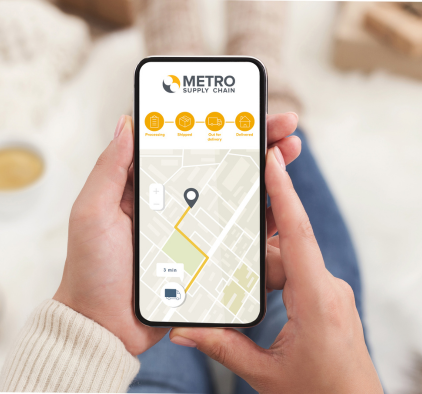What is last-mile delivery and why does it matter?
Last-mile delivery, also known as final-mile delivery, is the final and often most critical stage in the logistics journey, where a product is transported through a supply chain network directly to the customer’s doorstep. In today’s fast, on-demand economy, customers expect speed, accuracy and transparency from every shipment. Even a single delay or error can affect customer experience and brand reputation, potentially discouraging repeat business. Selecting the right last-mile delivery partner is not only a logistical consideration but also a strategic decision for brand development.
Effective last-mile logistics directly impacts:
- Delivery speed and reliability for ecommerce fulfillment and retail orders
- Customer satisfaction and loyalty in competitive markets
- Operational efficiency and overall last-mile transportation performance
A poor last-mile experience leads to delays, lost orders and dissatisfied customers—problems no business wants.
How last-mile tracking boosts customer confidence
Real-time last-mile tracking provides visibility and control for both businesses and customers. It sends accurate delivery updates via SMS or email, reduces customer service calls about order status, minimizes delivery exceptions and missed time windows, and improves brand perception by creating trust and transparency.
5 questions to ask before choosing a last-mile delivery partner
1. Can they handle your delivery volume and product types?
Your partner should manage high-volume parcel shipping for ecommerce fulfillment, bulky or fragile items requiring extra care, and temperature-sensitive products with strict handling needs. They should also offer scalability during peak seasons, including additional fleet capacity, temporary staffing or automation and a proven record of maintaining on-time delivery during surges.
2. What tracking capabilities do they provide?
Essential last-mile tracking features include live tracking and route updates, automated delivery notifications and proof of delivery with photos or signatures. The partner should integrate seamlessly with order management systems (OMS), customer relationship management (CRM) platforms and enterprise resource planning (ERP) software.
3. Do they have a reliable delivery station network?
A strong network ensures broad coverage, enabling service to rural, suburban and urban areas without gaps. The closer a station is to the recipient, the faster the delivery, the lower the risk of damage or loss and the greater the ability to offer same-day or next-day services.
4. Can they protect your brand and customer relationships?
Review performance metrics like average delivery time, on-time rate and resolution speed for complaints. Ensure they have clear processes for failed delivery attempts, reverse logistics for returns and claims handling for damaged or missing items.
5. Are they a strategic growth partner, not just a vendor?
Look for value-added services such as scheduled deliveries, white glove service and sustainable delivery options like electric vehicles. They should also provide delivery analytics, performance dashboards, feedback channels, and strategic planning support to align with your business growth goals.
Beyond the 5 questions: other critical factors to consider
Cost versus quality – Low prices may mean lower reliability. Balance cost with consistent, high-quality service.
Sustainability – Look for eco-friendly practices such as electric or hybrid fleets, route optimization to cut emissions, and packaging waste reduction initiatives.
Long-term success – Choose a partner that can adapt to changing customer expectations and evolving last-mile technology.
Partnering with Metro Supply Chain for last-mile delivery
Metro Supply Chain delivers scalable last-mile delivery services through a national delivery network, real-time inventory visibility, and flexible shipping options tailored to your business. Our proactive customer service, advanced analytics, and integrated transportation services—including fleet and freight management—help brands increase delivery speed, accuracy and customer satisfaction.
With Metro Supply Chain, you can optimize your final-mile logistics, protect your brand reputation and deliver the exceptional service your customers expect every time.
Contact us today to enhance your last-mile delivery performance and stay competitive in a rapidly evolving market.
Frequently asked questions about last-mile delivery
- How does last-mile delivery work?
Last-mile delivery is the stage where goods travel from a nearby distribution or delivery station to the customer’s address. It’s often the most visible part of the supply chain and plays a major role in shaping the customer experience.
- Is last-mile delivery expensive?
Last-mile delivery often accounts for the largest share of shipping costs due to labour, fuel and route inefficiencies. A partner with strong routing technology, local stations and optimized processes can help reduce expenses while maintaining speed and reliability.
- How can last-mile delivery improve customer satisfaction?
Fast, reliable and transparent deliveries build trust, reduce complaints and encourage repeat purchases. Features like live tracking, flexible delivery windows and proactive communication further enhance the experience.
- What’s the difference between last-mile and final-mile delivery?
The terms are used interchangeably to describe the final leg of the logistics journey, where goods are transported from a distribution point to the end customer.
- How does Metro Supply Chain stand out in last-mile delivery?
Metro Supply Chain combines a nationwide network, real-time inventory visibility, flexible shipping options and advanced analytics to deliver speed, accuracy and customer satisfaction while supporting long-term business growth.
- Can last-mile delivery be sustainable?
Yes. Many logistics providers are adopting eco-friendly practices such as using electric or hybrid delivery vehicles, optimizing routes to reduce fuel use and minimizing packaging waste. Metro Supply Chain offers sustainability-focused solutions such as an EV fleet, smart routing and recycled packaging to help reduce environmental impact.
- How do delivery hubs improve last-mile logistics?
Induction sites position goods closer to customers, cutting transit times, lowering the risk of delays and making it possible to offer same-day or next-day service. They also support better route planning and cost efficiency.
- What technologies are essential for last-mile delivery success?
Key tools include live-tracking, route optimization software, proof-of-delivery systems and seamless integration with order management and customer service platforms. These technologies improve speed, accuracy and customer visibility.
Related Posts
Archived Posts
- september 2024
- january 2024
- february 2024
- march 2024
- may 2024
